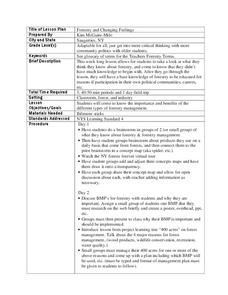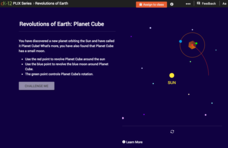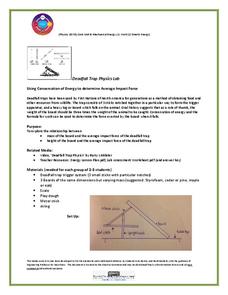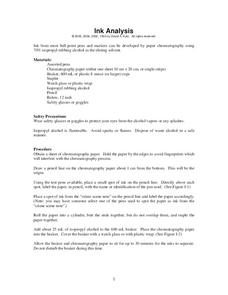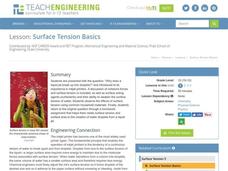PBS
Concept Map
Make the thought process visible with a handy concept map organizer. As learners develop their main ideas in research, writing, or creative development, they can add details and like ideas to the worksheet as needed.
ReadWriteThink
Concept Map
When you think of one topic, related ideas and details invariably follow. That's concept mapping! Jot down ideas with a straightforward graphic organizer that works both electronically and as a printed resource.
Texas State Energy Conservation Office
Investigation: Concept Mapping Fuels
After reading an article, "Fuels for Everything," collaborative groups create a concept map poster of the transportation and non-transportation fuels. This makes a strong introduction to the different types of fuels used for transportion...
Teach Engineering
Future Flights: Imagine Your Own Flying Machines!
What will flying look like in the future? The 21st lesson in a 22-part unit on aviation reviews the major aspects of the lesson. Pupils brainstorm ideas of a future flying machine.
Curated OER
Freshman Project-Part One-Science Concept Map & 4-Questions Strategy
In this project worksheet, students are given a rubric to asses their concept map and their four question strategy completed for their science project.
PBS
Genes 101: Life’s Instruction Manual | UNC-TV Science
Discover the common genetic ground shared by humans and chickens. Group members listen and view an animation about genes and proteins, which details their roles in building biological structures such as tissues and organs. Participants...
NASA
Things Are Not Always What They Seem
Science is magic that works. Magical color-changing beads and a coffee can that follows voice commands are just two examples of magic tricks that rely on science. After completing a hands-on activity and an experiment investigating the...
Safe Drinking Water Foundation
Water Pollution
An introductory lesson plan to a unit on water pollution, young environmentalists are asked to brainstorm examples of pollutants in water. This lesson plan will help develop a sense of what water pollution is and where the pollutants...
Curated OER
Forestry and Changing Feelings
Students investigate how the forest affects their daily lives by creating a concept map. In this ecological instructional activity, students create a concept map linking the forest to the many things they use each day....
Curated OER
Exploring Basic Physical Science Concepts
Students use the concepts of simple machines to construct a mobile. The inquiry is made in groups and presentations are made by constructing reports. The assessment is based upon the final product of the mobile and how students use...
Core Knowledge Foundation
Taking Care of the Earth Tell It Again!™ Read-Aloud Anthology
A read-aloud anthology closely examines human impact on the Earth while boosting reading comprehension skills. Through stories, scholars examine the concepts of natural resources, pollution, garbage, and recycling and brainstorm...
Smarter Balanced
Food Waste and Food Access
Forty percent of food in the US goes uneaten while 14.5 percent of US households lack a secure supply of food. As part of the preparation for a performance task assessment, groups consider statistics such as these about food waste and...
Teach Engineering
What Does Light See?
The second installment of a seven-part series focuses on the refraction of light and how it affects the colors we see. Learners consider how this concept connects to biosensors for cancer detection.
CK-12 Foundation
Revolutions of Earth: Planet Cube
Does assessing Earth Science vocabulary making your head spin? Test scholars' knowledge of revolving and rotating using an interactive tool. The movement of a new planet and its moon is in their hands, allowing them to explore...
Curated OER
Brainstorming and Creating a Graphic Organizer Using Kidspiration
Although focused on the winter ecology at Crater Lake, this lesson could be tweaked to use as a exploration of any region. After a visit to Crater Lake, learners discuss topics relating to winter in this area, such as the behavior of...
University of Saskatchewan
Using Conservation of Energy to Determine Average Impact Force
Explore the center of gravity with your science class as they create a deadfall trap with common materials. They research the concepts of energy conservation and gravitational force before dividing into small groups to create a model of...
Curated OER
Ink Analysis
High school chemistry class members become "detectives for a day" and use the concept of paper chromatography to analyze a note left at the scene of a crime. Pupils test the ink on the note with a solvent, such as isopropyl alcohol, to...
Teach Engineering
Surface Tension Basics
Back to the basics (of surface tension). The first installment of a nine-part series teaches young scholars about the basics of surface tension and how it relates to water droplets. They also learn how this concept allows for the...
University of Minnesota
What's the Deal? Addiction Card Game
Addiction is a big deal! Playing a game of cards helps learners understand the concept of addiction. Through their analysis, they examine the potential for addiction and how it varies for each individual.
BioEd Online
Skeletal Structures
What better way to study the structures of organisms than by creating a new being? After considering different types of skeletal supports (exoskeleton and endoskeleton), budding biogeneticists work together to create their own animals -...
BioEd Online
Muscles and Bones in Space
Being an astronaut takes not only high mental acuity, but also a high level of physical fitness, especially for those who spend a long amount of time away from Earth, such as the astronauts serving on the International Space Station....
Curated OER
Concept Webs for the Components of a Coastline
Students describe the components of a coastline. In this lesson on coasts, students brainstorm the various features of a coastline.
Curated OER
Cloning Around
Review concepts of cloning and genetic engineering and participate in a round-table discussion based on the ethics and potential of cloning with your class. Each learner then writes a formal essay on the topic, stemming from the debate.
Curated OER
Reproduction, Day 2: Pregnancy
Nearly all students have seen pregnant women and may have questions about human development. Intended for secondary students with mild to moderate mental disabilities, this instructional activity defines the process of pregnancy in...








